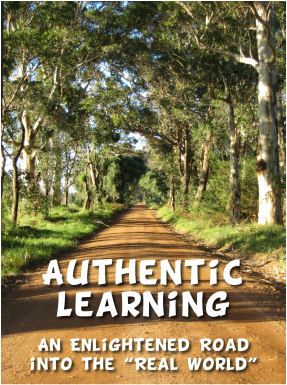In education, the term authentic learning refers to various educational and instructional techniques focused on connecting what students are taught in school to real-world issues, problems, and applications.
The basic idea of authentic learning is that students are more likely to be interested in what they are learning, more motivated to learn new concepts and skills, and better prepared to succeed in college, careers, and adulthood if what they are learning mirrors real-life contexts, equips them with practical and useful skills, and addresses topics that are relevant and applicable to their lives outside of school.
Concepts
- Learn by doing. Students obtain the foundational skills, knowledge, and understanding that working scientists actually need and use in their profession. In this case, students would also learn related skills such as critical thinking, problem solving, formal scientific observation, note taking, research methods, writing, presentation techniques, and public speaking, for example. In the “less authentic” learning situation, students acquire knowledge largely for purposes of getting a good grade on a test. As a result, students may be less likely to remember what they learned because the concept remains abstract, theoretical, or disconnected from first-hand experience. And since students were never required to use what they learned in a real-life situation, teachers won’t be able to determine if students can translate what they have learned into the practical skills, applications, and habits of mind that would be useful in life outside of school—such as in a future job, for example.
- Complexities and ambiguities of real life. On a multiple-choice science test there are “right” answers and “wrong” answers determined by teachers and test developers. But when it comes to actual scientific theories and findings, for example, there are often many potentially correct answers that may be extremely difficult, or even impossible, to unequivocally prove or disprove. For this reason, authentic learning tends to be designed around open-ended questions without clear right or wrong answers, or around complex problems with many possible solutions that could be investigated using a wide variety of methods.
- Interdisciplinary. Given that life, understanding, and knowledge are rarely compartmentalized into subject areas, and as adults students will have to apply multiple skills or domains of knowledge in any given educational, career, civic, or life situation. Generally speaking, authentic learning is intended to encourage students to think more deeply, raise hard questions, consider multiple forms of evidence, recognize nuances, weigh competing ideas, investigate contradictions, or navigate difficult problems and situations.
Issues
- The purpose of public education: Is it to get students to pass a test or to earn a high school diploma? Or is the purpose to prepare students for success in life after graduation, including postsecondary education and modern jobs or career paths? Advocates of authentic learning may contend that the purpose of public education is to look beyond test scores or graduation rates—success inschool—to the knowledge, skills, and character traits students actually need to succeed in adult life—success outside of
- How and what schools should teach. Critics may question whether authentic-learning experiences can cover enough academic content in the core subject areas to ensure that students acquire a broad, well-rounded knowledge base. Critics may also argue that authentic learning, and related instructional strategies, may displace more traditional yet effective forms of teaching, fail to equip students with “the basics,” or lead to disorderly classrooms, among other possible arguments. Advocates would contend, however, that these criticisms are unfounded, and that a well-planned curriculumbuilt around authentic-learning experiences can cover all the academic subjects and concepts that students need (unless the learning experiences are poorly designed and executed, of course). In some cases, criticism arises in response to a negative experience with authentic learning or from an insufficient understanding of the concept.
- Logistical and instructional. For example, authentic learning may require significantly more planning and preparation, and teachers may need to acquire new and more sophisticated instructional techniques or substantially revise lesson plans they have used for years. Authentic learning may also introduce more logistical complexities, particularly when learning experiences take place outside of the school or classroom (in schools, even seemingly minor logistical tasks, such as making travel arrangements or securing parental permissions, can take up a lot of time).
